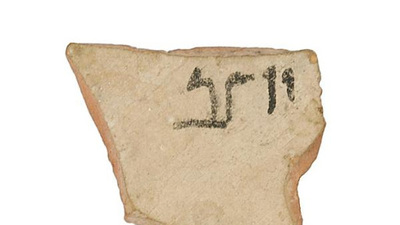As I sit in my 'ma’mad' (shelter) while this dreadful war is taking place, I am reminded of a Dutch Jewish novel called De Soete Bazinne (The Sweet Mademoiselle), about one of the notorious battles between the Dutch and the English navies in the 17th century. (1) The issue at stake was to whom the North Sea belonged, the Dutch or the English.
The English fleet had just destroyed a Dutch commercial vessel, and a child aboard the ship was drowned. The boy’s older friend, Jan Seghers, who had become mentally disturbed because of this tragedy, called for a lawsuit against God for not saving the innocent child.
Upon hearing of this, the fanatic pastor of the Amsterdam Christian community was so infuriated that he initiated a small riot and insisted that the city council of Amsterdam expel this mentally disturbed man, who he believed was possessed by the devil.
The bailiff of Amsterdam, the highest authority in the city, did not know what to do. He asked the leader of the Jewish community, Dr. Chaim Toldeche, a pious and wise Jew, what to do and how to help this mentally handicapped person.
To the bailiff’s total surprise, Toldeche suggested that the court case against God should go forward. He argued that there was truth to Seghers’s claim. After all, God – no less than humans – must be held accountable for His deeds.
The shocked bailiff could not believe his ears, and asked the Doctor where this court case should take place. In all seriousness and without blinking an eye, the Doctor suggested that it should take place in front of the Rabbinical Court of Amsterdam.
After regaining his composure, the bailiff rejected this suggestion on the basis that the Christian population of Amsterdam would be so infuriated with the idea of God standing trial at the Rabbinical court, that it would result in a pogrom against the Jews that would not leave one Jew alive.
The Trial of God
Although we do not find an actual trial of God in the Bible, God having to give accountability for His behavior in times of disaster is not uncommon. Throughout history, this is part of the normative Jewish Tradition.
The first man who dared challenge God for planning injustice against humans, is Abraham. After God informs him that He plans to destroy the citizens of the town of Sodom because of their wickedness, Abraham protests: “Will You indeed sweep away the righteous with the wicked? (…) What if there should be fifty righteous people in the midst of the city?(…) It would be a sacrilege to You to do such a thing (…) to bring death upon the righteous along with the wicked, so that the righteous will be like the wicked (…) Shall the Judge of all the earth not do justice?” (2)
On being told that there are no fifty righteous people in the town, the most outrageous discussion in all of human literature takes place. Avraham asks, what about forty-five righteous people. When this does not work, Avraham goes even more on the offensive: What about thirty people? Twenty? Or even ten righteous people? Avraham’s impertinence is unprecedented.
But God does not lose His patience and takes it all in stride. as if this were a normal discussion between two friends. In the end, “God departed when He had finished speaking to Abraham and Abraham returned to his place (18:33)”; as if nothing extraordinary had happened.
Throughout the Tanach, we see this blatant refusal to give in to God’s evil. The prophet Yirmiyahu, confronts God with the following impudence: “You are always righteous, Lord, when I bring a case before You. Yet I would speak with You about Your justice: Why does the way of the wicked prosper? Why do all the faithless live at ease? You have planted them, and they have taken root; they grow and bear fruit!” (12:1-2)
And so we find other occasions in Tanach where God is challenged about His injustice. (See Tehilim, 44:24-27; Habakkuk 1:23, 1:13; Iyov 27:2-6.)
There is never justification of God’s evil, only indignation. There is no “Unde malum” – “from where evil – when there is a God?”, as in later Jewish and non-Jewish sources. It is all blunt and uncompromising.
The Biblical Jew openly resists being cowed in the balancing between him and his God. Instead, he says, “We will not let God get away with this.”
It is the unprecedented struggle in which the Biblical man asserts nothing less than his moral equality with his God. This is highly significant.
How is this possible? It is made possible because there is a covenant between God and man, and both are bound by the same moral standards. God is not only a metaphysical God but also the moral God of justice and mercy. He may have His reasons for creating evil, known only to Him. And these reasons may make sense to Him, but definitely not to us. Nor does this free Him from taking responsibility for the evil He created, or allows, in the sight of man.
In fact, God ensnares Himself by insisting that there is an equal covenant between Him and man. God is bound by His own moral rulings.
God’s Prayer
According to the Talmud, God prays to Himself, saying “May it be My will that My mercy may suppress My anger.” (3) Such a prayer may seem scandalous – even blasphemy – in non-Jewish religious circles, but for the religious Jew it is authentic, and in no way heretical. Such a prayer arises from within the deepest belief in God’s righteousness. How can a righteous God not do justice?
The person questioning God’s actions defies, but does not deny. His critique is sanctioned by the whole of Jewish tradition. While all sorts of attempts were made to reconcile these opposing notions in later Jewish literature, the Tanach’s critique on God is clear and unapologetic.
The great prophet Yeshayahu (5:20) states this clearly. “Woe to those who say of evil, it is good, and of good, it is evil; who change darkness into light and light into darkness, who change bitter into sweet and sweet into bitter.”
There is no mercy for God when it comes to justice. Neither does God attempt to explain Himself. He only asks man, nearly mockingly, where he was when He founded the universe and stops short (Iyov 38:4).
God’s Repentance on Yom Kippur
In one of the most perplexing rituals in the Temple on Yom Kippur, two identical male goats were sacrificed. But they weren’t sacrificed in the same way; one of them was offered in the classical way on the altar, but the other one was sent away into the wilderness where it would fall to its death from a cliff. (Vayikra 16:6-30.)
In a fascinating essay inspired by Rav Kook’s Orot Hateshuva, Rabbi Shlomo Aviner brings an unusual explanation for this odd ritual. (4) According to Rav Aviner, human beings cannot atone for all the evil in the world, because it is God himself who created the force of evil. Thus, one goat is brought in the name of the human being to atone for his share in all the evil he has done. But the other goat, the Azazel, is brought in the name of God for having created this force of evil.
It is true that by creating the world in which human beings could do good, God was forced to introduce evil as a challenge for us to overcome. Without this counter-force we would have no freedom of will to choose between good and evil.
But human beings are not responsible for this force of evil. Rather, it is the “collateral damage” which God has caused by allowing humans free will. The existence of evil is inherent to the creation of the world. (See: Yeshayahu 45:7)
What’s more, God shares partial responsibility for our wrong-doings, since by creating the force of evil, He created the possibility for us to sin. Whenever we sin, God sins as well.
Thus, the goat for Azazel carries God’s sins to a deserted land, uninhabited by human beings – a place of emptiness, desolation, and destruction where man is absent and only God dwells. It is a way for us to say, I have done my part by repenting. Now let Him do His part.
Theodicy is no Escape
This is no doubt a metaphor, but it is all the more fascinating and sends a powerful message; the need for accountability on all levels. Authentic Judaism does not fall back on theodicy, by which God, as the Supreme Being, gets a free pass. In the eyes of Judaism, this won’t do.
The Jewish Tradition never told people not to question God’s ways. Such questions are not only legitimate, they are holy because they rise from a deep realization that God is righteous and at the same time honest enough to admit that He is at fault. This may sound outrageous, but it is most profound. I am reminded of the statement by the Swiss author and dramatist, Friedrich Dürrenmatt: “He (who) confronts the paradoxical exposes himself to reality.” (5)
It is as if God is saying with Walt Whitman: “Do I contradict myself? Very well then, I contradict myself. I am large and contain multitudes.” (6)
Elie Wiesel once said that he was present when God was put at trial in Auschwitz, and was pronounced guilty for all the evil of the Holocaust. Consequently, he wrote a play on this topic: The Trial of God. (7)
But what is even more remarkable is the end of this true story: After the trial was over, and God was pronounced guilty, the Jews organized a minyan and prayed mincha, the afternoon prayer service, praising Him for His greatness!
This powerful message says it all: for those who seek to justify God at all times, there is no place. And for the atheist who says there is no God, he is like fish in the ocean wanting evidence of water.
Or in the words of the poet Edward Young:
Bid mercy triumph over – God himself,
Undeified by their opprobrious praise:
A God all mercy is a God unjust. (8)
Dr. Chaim Toldeche and Elie Wiesel were right: God must stand trial, and must repent for the creation of evil in the world.
And after He is found guilty, we will turn to Him in prayer and ask for His mercy.
(1) Maurits Wertheim, Dutch Jewish novelist, 1904-1968.
(2) Bereshit 18:23-25.
(3) Berachot 7a.
(4) Shlomo Aviner, Tal Hermon, 1985, pp 184-185.
(5) Friedrich Dürrenmatt, “21 points”, the Physics, 1962
(6) Walt Whitman, Song of Myself, 51.
(7) See also: Jewish Chronicle, Sept 19 2008: “Wiesel, Yes, we really put God on Trial.
(8) Edward Young, ‘Night Thoughts’ P. 231.




